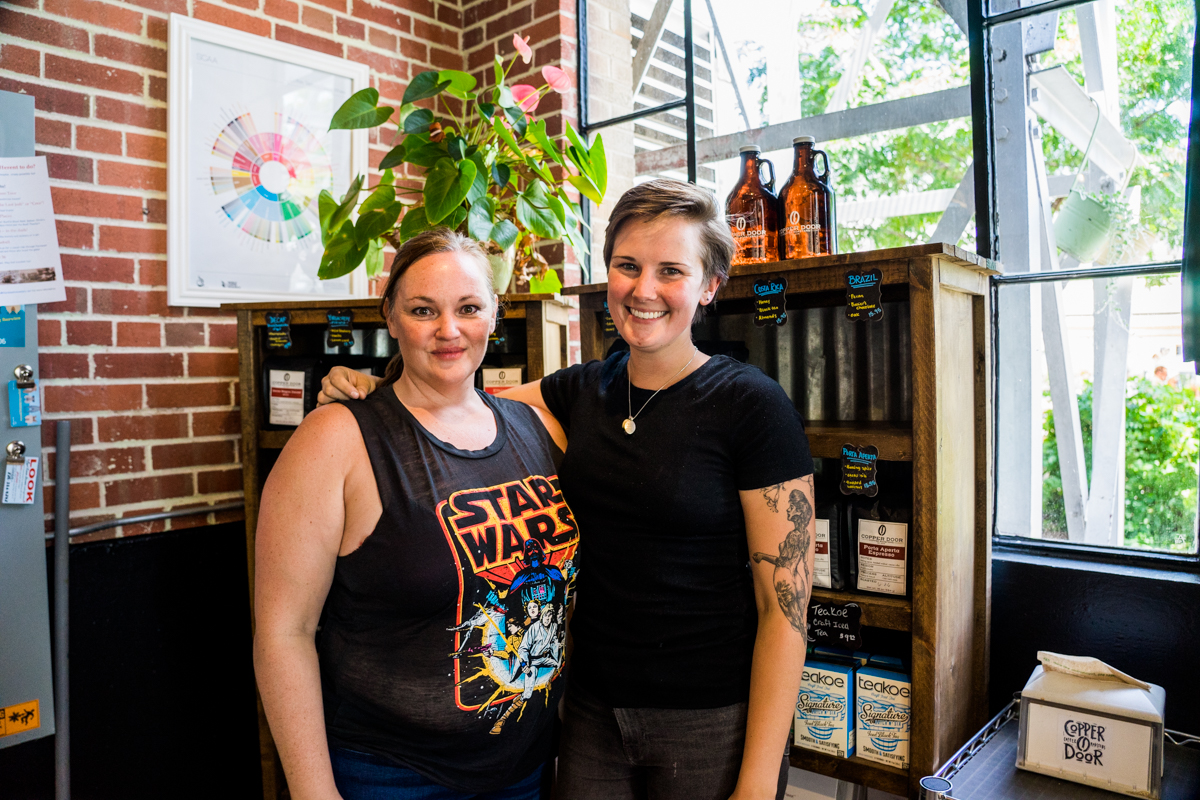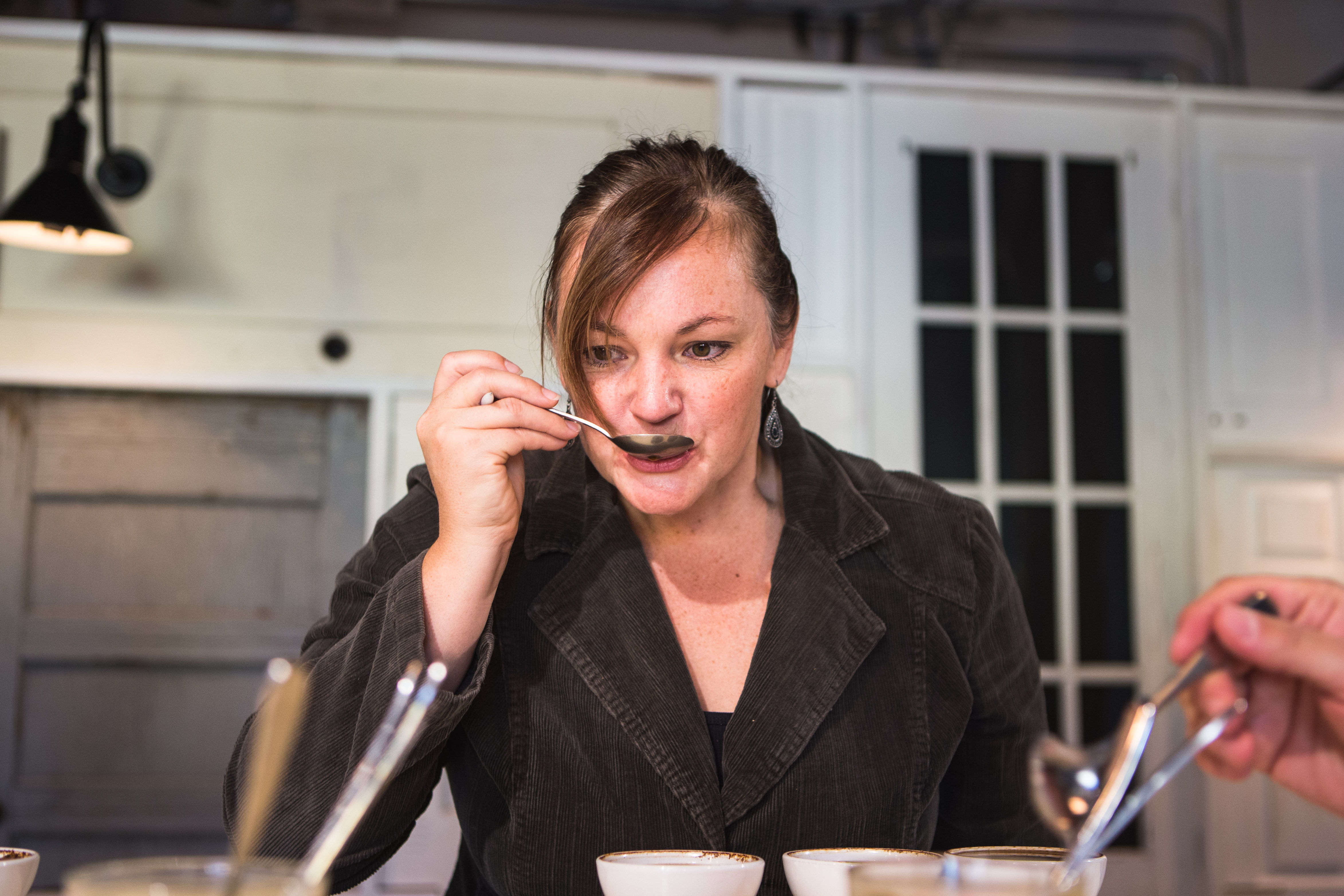The #MeToo Movement has done a distinct job of highlighting how unfriendly, and often hostile, the workplace can be for women. And in recent months, in industries across the board, men in powerful positions have been called out. From the fashion industry to the media, restaurants and even coffee shops — women have begun to speak up against an issue that has continued for far too long. And now, two Denver women, Hannah Ulbrich and Elle Taylor, are adding their voices, and their efforts, to the movement.

Hannah Ulbrich and Elle Taylor. Photo by Brittany Werges.
Ulbrich and Taylor have something very specific in common. They are some of the only women who independently own Denver coffee shops (Copper Door and Amethyst, respectively). Ulbrich is also the founder of the first woman-owned roastery in Denver by the same name. Since they’ve opened up their own brick-and-mortar shops several years ago, they have bonded over their mutual understanding that being a woman in this field isn’t always the easiest — especially in ownership roles.
“It’s exhausting,” said Taylor in reference to the constant questioning she feels from her male counterparts. “It happens all the time. Even if I am just expressing a frustration.”
“I’m often the only woman at a cupping table buying coffee and I’ll get passed up,” continued Ulbrich. “I’m a judge too for the US roasters competition and, oftentimes, I’m told what I should be tasting.”
Initially, it was their shared experiences that brought them together. But over time, it became apparent this wasn’t happening to just them, nor was it only these microaggressions. Much like the Harvey Weinstein scandal — a watershed moment broke down the floodgates for women to speak out in craft coffee (see #coffeetoo). In particular, the case of sexual harassment at Four Barrel in San Francisco created a deluge of outreach to both Taylor and Ulbrich.
“All of a sudden I had emails from all these women who were like, ‘Can I come work for you?’ And I wasn’t hiring, so why are all these women from very specific companies in Denver coming to me? And then I realized that it was because of this Four Barrel thing,” said Ulbrich. “It’s uprooting the base … and [women] are like, ‘yeah, I don’t have to stand for this either.’”
While there are no specific accusations at this time, Taylor and Ulbrich want to address the larger issue they are seeing — that the culture in craft coffee and the service industry is broken.
“The problem with coffee is that we project this idea of inclusion that doesn’t actually exist.”

Hannah Ulbrich cupping. Photo by Kyle Cooper.
“The problem with coffee is that we project this idea of inclusion that doesn’t actually exist,” explained Taylor.”It seems like a slightly alternative culture really but we suffered the same problem of toxic masculinity and heteronormativity and all the things that cultivate this sort of culture. So I think that people think it’s less prevalent in coffee when really it’s happening just as much here.”
Unlike other industries, Taylor and Ulbrich decided to tackle these issues a bit differently than what you may have seen in the news. Instead of tweets and press conferences, Ulbrich and Taylor have decided to create resources for small businesses. Instead of looking at individuals, they are looking at the system — agreeing (and hoping) that the issue may lie in a lack of resources for small business owners to properly address instances of sexual harassment.
“My employee manual just says ‘sexual harassment will not be tolerated.‘ That’s it. And I was like, I wish I knew how to handle that better,” explained Ulbrich. “Like I don’t know what someone’s rights are as a worker who’s been harassed and when I was harassed earlier in my life I would just turn the other cheek and ignore it because that’s what we did as women in service industries. It’s just so prevalent and so ingrained that I thought no one’s going to take me seriously,” she said. I’ve felt like I don’t know how to deal with this in my own business and I don’t know who to go to and I don’t have the financial resources to hire an HR person to come in.”
Like Ulbrich, many small businesses don’t have the corporate finances and resources to bring in a full-time human resources employee, and many are left with vague answers to complicated problems. That’s why instead of simply cutting their losses and settling for ambiguous sexual harassment protocol descriptions, these two took their concerns to Sarah Murphy at the Office of Economic Development in search of further resources and guidance — unfortunately, there were none.
“[We] asked her if there were any resources that we could go to for this issue,” explained Taylor. “She was like, ‘no, but we can create them.‘ So we came up with the idea of workshops for the community and she was like, ‘I love this idea, this is amazing, no one’s doing this.”
Working with Rocky Mountain Craft Coffee Alliance, the idea is to have workshops for business owners and employees in the service industry for practical and actionable tools to use when sexual harassment in the workplace needs to be addressed. Their aim is to answer questions like where to go when you need a lawyer, what steps to take as a business owner when sexual harassment is happening at your company and what steps to take as an employee when you’re experiencing it. And while the workshops are geared toward service industry professionals, the two believe that they’ll be useful for people across the board — especially in the coffee community.

Photo by Kyle Cooper
“I think that this workshop is important for business owners, men and women. It’s going to open this conversation to people who may not have heard this before — who think they’re doing everything right. Who think that women don’t have a problem when the truth is people are just not saying anything. It’s not that they aren’t uncomfortable or they don’t have problems — it’s that they’re just not speaking up,” said Ulbrich.
As service industry professionals, Ulbrich and Taylor have made it a priority to build a safe culture in their individual companies. For example, at Amethyst, Taylor asks that her staff sign an agreement to keep their actions and language safe for everyone. And while she has a three strike policy for most issues, her tolerance for discrimination and sexual harassment is zero. It’s a line she will not allow to be crossed at her company and a line that she hopes will begin to be honored across the board.
“That’s one of the cornerstones of our business,” expressed Taylor. “Women and people, in general, don’t have to feel uncomfortable. You don’t have to feel disrespected or not seen by your boss. You don’t have to feel like you’re going to make a decision that’s going to make them upset. You don’t have to feel like you have to engage with people in a way that makes you uncomfortable. Those things are all things we can eradicate.”
And that’s exactly what these workshops have been created for — to help eradicate sexual harassment in the workplace. From speakers like Julia Hill-Nichols, founder of Leaders Cove to Johnathan Koonce, associate attorney at Campbell Litigation — guests will have the opportunity to learn actionable steps to take when faced with issues of discrimination and sexual harassment. In addition to the speakers, attendees will receive an HR packet that can be utilized in their own company employee handbook, a tool that Taylor and Ulbrich believe will influence the greater Denver community for the better.
“I would like to see every business owner leave with an HR packet in their hands, stated Ulbrich. “Explaining this is what you do when this happens, et cetera. My biggest goal is to have employees feel seen and heard at the end of the day. And if you put the right tools in people‘s hands, then that would be an impact on the city. I hope it’s well attended by people who don’t think they need to attend. I hope that people look at it as a learning opportunity and not as a judgment of something you’re doing wrong. Maybe just look at it as a way to improve not only your process around sexual harassment but also your entire business culture. I just know that there are some companies out there that probably aren’t gonna show up and those are the ones that need to show up.”
Ulbrich and Taylor understand that two seminars won’t fix everything — but it’s a start. They see this as a potential building block and a way to show their fellow craft coffee and service industry folks that the issue is being taken seriously — and not just in the news and on Twitter, but here at home, too.
The small business HR seminar will take place from 8:30 a.m. to 12:30 p.m. on Wednesday, July 18 at The Commons on Champa, 1245 Champa Street, Denver. Attendance is $30 for RMCCA members and $60 for non-members, and tickets can be purchased here.
